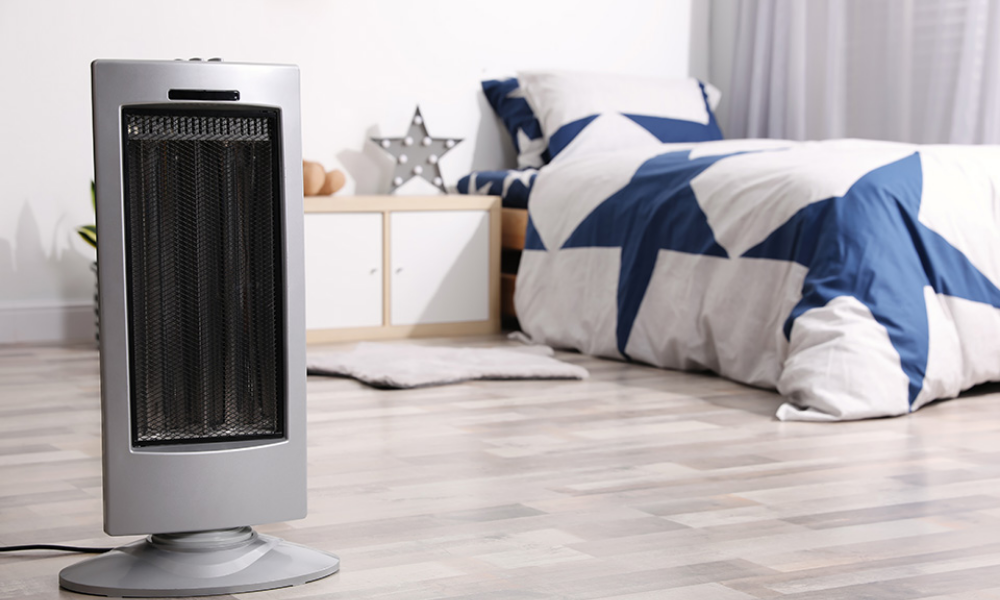Space heaters can be a great way to keep your home warm and comfortable during the winter months. But with so many different types and models available, it can be challenging to know which one is right for you.
In this buying guide, we will help you understand the different types of space heaters available, and we will provide some tips on how to choose the best one for your needs.
When Ontario’s winter arrives, many of us may wish to explore using electric space heaters to stay warm while conserving electricity. If you’re in the market for one, here are some energy-saving tips to keep in mind.
Is It True that Space Heaters Save Energy?
Electric space heaters might help you save money on your utility bills. What’s the catch? Only if you’ve turned down the heat elsewhere in the house and are only using the heaters to heat your rooms.
You may save energy overall by setting your thermostats to a lower temperature and using a space heater to keep one area at a time warmer, such as a home office, whether your home utilizes a gas furnace or electric heating. Many house furnaces in Ontario utilize natural gas to heat, but because the engine still needs to run on electricity, keeping the temperature lower saves both.
On the other hand, if you keep your home’s electric baseboards or furnaces running as usual while using an electric space heater for extra warmth, you’ll be wasting more energy and spending more money.
Which Space Heater Uses the Least Amount of Energy?
Unlike many other appliances and electronics, space heaters are not approved by the ENERGY STAR program. Any electric heater converts electricity to heat with 100 percent efficiency. The good thing is that you can compare which models consume more or less power by glancing at the wattage on the box from an energy efficiency aspect. If two models have the same wattage, they will use the same amount of energy is used for the same amount of time and under the same conditions. To avoid warming your space and incurring extra electricity bills, pick the lowest wattage that fulfills your demands.
What Amount of Space Heating Do I Require?
Many “whole room” heaters are around 1,500 watts, the maximum power that may be safely plugged into a household wall. To avoid overloading the circuit, it’s good to avoid connecting anything else into the same outlet (see more on safety below).
Manufacturers and retailers frequently recommend a heating capacity of 10 watts per square foot of a room. In a 150-square-foot space, a 1,500-watt heater would suffice. Smaller personal heaters may have a wattage of half that. A personal heater, such as those built for a tabletop, may be best if you only want to stay warm in one area, such as at your work. If you want to keep an entire room warm, a larger heater may be better.
Which Kind of Space Heater Should I Get?
Along with the correct size, you’ll need to figure out which type of space heater is best. Aside from oil-filled heaters, which tend to be larger, most model types exist in various sizes. Many models feature numerous heat settings, allowing you to use fewer watts (and hence less energy) at lower temperatures.
The following are the most prevalent types of space heaters on the market:
Fan-Forced Convection Heaters
Convection heaters come in various sizes and heat up quickly, making them a good option for warming up a room fast. These heaters use different heating elements internally, such as ceramic, to heat the air around them. Warm air rises (either naturally or aided by a fan), and cooler air is pushed down, where the space heater warms it.
Many convection space heaters will use a fan or may have oscillation features to distribute warm air. Some models have a fan-only setting, which means you can also use your space heater in the warmer months.
However, allergy or asthma sufferers may want to avoid a model that uses a fan, which would blow dust and allergens around. Models with fans are likely to be noisier, so keep that in mind if you plan to use your heater during the day or at night.
Infrared or Radiant Heaters
Infrared heaters, like radiant heaters, provide direct heat to an item — in this case, a person – rather than to the surrounding air. Consider how relaxing it is to sit in the sun or beside a bonfire. A radiant heater is a beautiful alternative if you tend to stay in one area and want direct heat to stay warm. These types, however, can be more expensive.
Oil-Filled Heaters
Oil-filled heaters are often larger and can be used to heat an entire room. The diathermic oil inside these space heaters warms up, providing radiant heat when you’re close by and warming the air through natural convection (without a fan). After turning off, oil-filled heaters take longer to warm up and cool down. This slower rate of temperature change may make you feel more at ease than space heaters that blast warm air but then cool down quickly. Oil-filled options also maintain heat effectively, providing warmth even after being switched off. You may be able to feel warmer without spending any energy as a result of this.
These models are typically larger, making them less moveable from room to room than other options. They’re also more expensive than some other kinds of heaters.
Micathermic Heaters
Convection and radiant heat are combined in these fanless, panel-style heaters. Mica sheets, a mineral, are used to create the panels. Natural convection takes over to heat the room as heat radiates from the panel. If you need to heat an area for an extended period, this choice may be a sensible investment.
Choose the Characteristics that Are Most Important to You
While space heaters of the same wattage will be equally energy-efficient, you can seek features that will help you save money and get the most out of your investment. Here are a few things to think about:
Thermostat With Programmability. An adjustable thermostat allows you to choose the appropriate temperature for your space heater, preventing it from wasting energy by operating when it isn’t needed.
There Are Several Heat Settings to Choose From. Some space heaters have several settings, such as an “eco mode,” which allows you to use fewer watts when you don’t need as much heat.
Timer. If you forget to switch off your heater when you leave a room, a timer with an automated shut-off can help you make sure you’re only using it for a particular amount of time.
Lighting. Some space heaters include lights that simulate warmth and can contribute to the ambiance of a space, so you might want to go for a style that gives off a pleasant glow. However, keep in mind that this does not cause the unit to heat up or perform more efficiently, so if a unit costs more because of lighting features, the extra cost might not be worth it to you.
Portability. Consider whether you’d like to use your space heater in multiple locations at different times of the day. Some types have wheels to make moving them around simpler. Many space heaters have remote controls, allowing you to change the temperature from across the room.
Don’t Overlook the Importance of Space Heater Safety
Electric space heaters can make you more comfortable, but if you’re not careful, they might potentially cause a fire. Keep the following suggestions in mind:
Look for Safety Certification on the Label Before You Buy. Look for a model that has been approved by a reputable testing organization, such as the Canadian Standards Association (CSA) or Underwriters Laboratories (UL) (UL).
Look for Characteristics that Will Protect You. Choose a model with “tip over” and automatic shut-off features, which will turn the unit off if it falls over or overheats.
Heaters Should Always Be Plugged Directly into the Wall. Power bars are an excellent way to save energy, but not with space heaters. Because power bars aren’t designed to handle the wattage required by space heaters, they may overheat and catch fire. For the same reason, never use an extension cord with a space heater. Finally, don’t bury the heater cord under a rug since it could overheat and cause a fire.
Furniture, Curtains, and Water Should All Be Kept Away From Space Heaters. Never drape anything over a space heater, such as clothing. Also, avoid allowing the heater to come into touch with water since this could cause a short circuit.
Reconsider Your Heating Requirements
If you’re in the market for a space heater, now might be a good time to reconsider your total house heating strategy.
You may need to upgrade your insulation, replace your windows, or replace your furnace or principal heating source. There are, however, several essential, relatively low-cost modifications that can help. You can, for example, change the direction of a ceiling fan to redistribute warm air that rises to the ceiling during the cooler months. Sealing air leaks around doors and windows with weatherstripping is another technique to keep your house more comfortable and save energy.
Conclusion
Space heaters can be a great way to keep your home warm and comfortable during the colder months. By understanding the different types of space heaters available, you can choose the one that is best suited for your needs. We hope this buying guide has helped you learn more about space heaters and made it easier to decide which one is right for you. Thanks for reading!









Leave a Reply